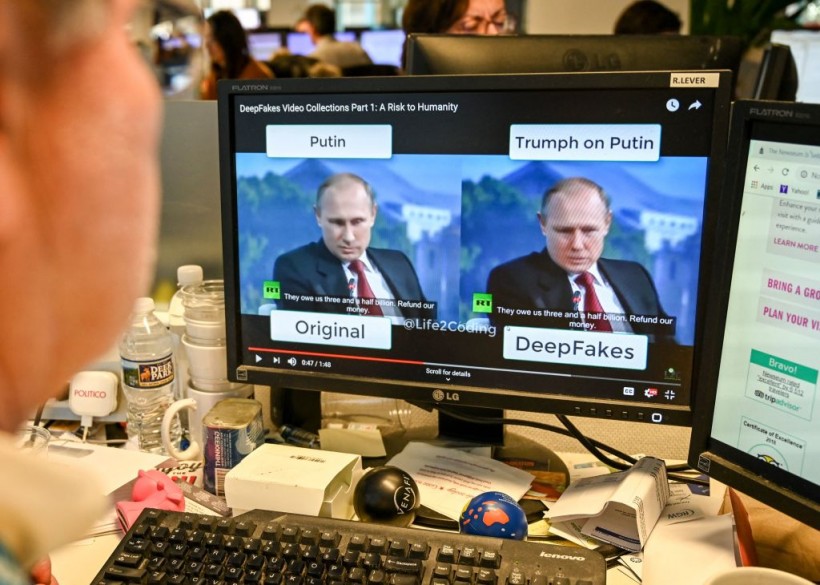A research team has conducted a comprehensive analysis of deepfake content in the context of the Russia-Ukraine conflict. The study examined over 5,000 posts on social media platform X in a span of seven months.
Revealing Impacts of Deepfake in Wartime Misinformation
The collaborative research initiative led by the University College Cork (UCC) in Ireland has undertaken the first comprehensive analysis of deepfake usage in the spread of misinformation during wartime.
The study examined more than 5,000 posts on X, formerly known as Twitter, during a period of seven months of the Russia-Ukraine conflict.

(Photo : ALEXANDRA ROBINSON/AFP via Getty Images)
A AFP journalist views a video on January 25, 2019, manipulated with artificial intelligence to potentially deceive viewers, or "deepfake" at his newsdesk in Washington, DC.
Interesting Engineering reported that this duration witnessed the circulation of multiple deepfake materials, such as fabricated videos depicting Russian President Vladimir Putin announcing a ceasefire and Ukrainian President Volodymyr Zelensky seemingly surrendering.
Additionally, deepfake content was also generated using video game footage to support the urban myth fighter pilot "The Ghost of Kyiv," providing the researchers with varied content for their analysis.
In collaboration with UCC colleagues, lead researcher John Twomey scrutinized the ensuing discussions on the social media platform after the dissemination of deepfakes. Their findings revealed that deepfake content triggered a spectrum of reactions among users.
For example, the deepfake video portraying Zelensky's surrender elicited shock, concern, and bewilderment responses. However, similar content featuring political adversaries went largely unnoticed by users, who perceived it as satire or a form of entertainment.
This study provides valuable insights into the complex and varied responses to deepfakes on social media during times of conflict. In response to these concerns, some users attempted to provide educational resources to help the public identify and differentiate deepfake content.
Read Also: India Cracks Down on AI Misinformation, WhatsApp May Be Required to Display First Message Source
Deepfakes Triggering Widespread Skepticism
Paradoxically, this well-intentioned initiative has unintended consequences, triggering widespread skepticism about the authenticity of all online content.
This climate of distrust gave rise to various conspiracy theories, with claims that world leaders were going into hiding and deepfakes were being utilized to depict them as actively addressing the crisis.
Even concrete evidence of Russian aggression was met with suspicion, being labeled as deepfake material, further eroding trust in established media outlets.
Regrettably, the entire incident was written off as a deepfake meant for anti-Russia propaganda purposes. Twomey shared a vital insight gained from their analysis of the X discourse dataset. Their findings brought a startling revelation - a significant portion of the misinformation problem was linked to misidentifying authentic media as deepfakes.
Additionally, the study unearthed a noteworthy connection between the presence of deepfakes, the spread of conspiracy theories, and the rise of a troubling level of skepticism among the public.
In a recent incident, the Associated Press reported that manipulated images portraying former President Donald Trump avoiding arrest gained significant traction on social media.
The researchers emphasized that the increasing prevalence of deepfakes was eroding trust in legitimate media sources, highlighting the urgency for decisive action.
Twomey stressed the importance of news outlets taking a proactive role in raising awareness about deepfakes. This entails educating the public on what deepfakes are, their current capabilities, and the potential evolution of this technology in the years ahead.
Posted on PLoS One, such efforts are seen as a crucial strategy to combat the growing influence of deepfakes.
Related Article: AI-Generated Deepfakes Raise Concerns Ahead of 2024 US Presidential Election










